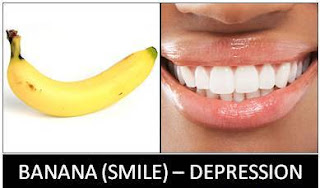Cheer yourself up and put smile on your face by eating a banana. The popular fruit contains a protein called tryptophan. Once it has been digested, tryptophan then gets converted in a chemical neurotransmitter called serotonin. This is one of the most important mood – regulating chemicals in the brain and most anti – depressant drugs work by adjusting levels of serotonin production.
Higher levels are associated with better moods.
Close-up, the tiny green tips on a broccoli head look like hundreds of cancer cells. Now scientists know this disease-busting veg can play a crucial role in preventing the disease.
Last year, a team of researchers at the US National Cancer Institute found just a weekly serving of broccoli was enough to reduce the risk of prostate cancer by 45 per cent. In Britain , prostate cancer kills one man every hour.
Root ginger, commonly sold in supermarkets, often looks just like the stomach. So it’s interesting that one of its biggest benefits is aiding digestion. The Chinese have been using it for over 2,000 years to calm the stomach and cure nausea, while it is also a popular remedy for motion sickness.
But the benefits could go much further. Tests on mice at the University of Minnesota found injecting the chemical that gives ginger its flavour slowed down the growth rate of bowel tumours.
But the benefits could go much further. Tests on mice at the University of Minnesota found injecting the chemical that gives ginger its flavour slowed down the growth rate of bowel tumours.
A nice ‘holey’ cheese, like Emmenthal, is not just good for your bones, it even resembles their internal structure... And like most cheeses, it is a rich source of calcium, a vital ingredient for strong bones and reducing the risk of osteoporosis later in life. Together with another mineral called phosphate, it provides the main strength in bones but also helps to ‘power’ muscles. Getting enough calcium in the diet during childhood is crucial for strong bones.
A study at Columbia University in New York showed teens who increased calcium intake from 800mg a day to 1200mg – equal to an extra two slices of cheddar - boosted their bone density by six per cent.
The stir-fry favourite bears an uncanny resemblance to the images we see of ‘swimming’ sperm trying to fertilise an egg. And research from the US suggests they could play an important part in boosting male fertility.
A study at the Cleveland Clinic in Ohio showed that to make healthy sperm in large quantities, the body needs a good supply of vitamin C, a powerful antioxidant that protects cells against damage by harmful molecules called free radicals.
Just half a cup of bean sprouts provides 16 per cent of the recommended daily allowance of vitamin C for a man. It’s not just dad but baby too who could benefit. Bean sprouts are packed with folate, a vitamin that prevents neural tube defects, where the baby is born with a damaged brain or spine.
Pheonix; errrmm... soooo yummie...









No comments:
Post a Comment